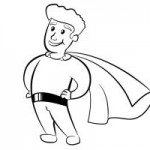Sympathetic characters are absolutely vital to good (readable!) fiction. We’ve already mentioned that two things combined make characters sympathetic: strength and struggles.
But if a little strength and a little struggling are good things, then why not a lot of strength or a lot of struggles? Isn’t a super strong character going to be even more sympathetic than one who has some problems? Or maybe piling on the pain endlessly will make a character even more sympathetic?
 Okay, you guessed it—just like a character who just gets more and more bad stuff piled on, a character who’s easily and confidently stronger than every challenge he faces isn’t really sympathetic.
Okay, you guessed it—just like a character who just gets more and more bad stuff piled on, a character who’s easily and confidently stronger than every challenge he faces isn’t really sympathetic.
Not by Strength Alone
A character who’s just a bundle of strengths has no struggles. He takes everything in stride, and everything continually works out for him. Here’s why:
Jeremy stared at the flames leaping from the third-story windows. There were three children unaccounted for. He took a deep breath and barreled through the open doorway, up the stairs, around corner after corner. The distant cries for help finally reached his ears over the cacophonous crackling. The children—trapped behind a locked door.
He threw his full weight against the door—it splintered at the massive force. He scooped up the children, two in his right, one his is left, and ran back down the stairs.
Jeremy gasped for a cool breath as he burst through the doorway to the outside. The headmistress held out her arms for a child and he held out one of them, smudged and bedraggled but alive. She clutched the boy to her chest, her eyes shining with admiration. “You’re our hero,” she said.
Is Jeremy strong? Brave? Courageous? Yeah, he’ll be getting a key to the city for his heroism. But interesting? Sympathetic? Kind of—but I think most people would like to think they’d be willing to help someone in danger. Everything works out really easily for Jeremy. He’s strong enough, he’s brave enough, and doggone it, people like him. I mean, um, he’s fast enough, and he never really doubts his ability to perform an extraordinary feat.
Ever notice how much dang kryptonite there seems to be floating around Superman’s story world? It’s almost more prevalent than air. Why do movie makers and screenwriters always dig up more of this stuff? Because watching a totally invincible man of steel defeat a dastardly enemy is entertaining for about four seconds. After that, it’s predictable—heck, it’s trite.
Try this one instead:
What was he doing in here? He was no hero. And now the heat and the smoke made it impossible to walk, to see, to think.
He crawled up the stairs, ducking his head down to the treads to catch a breath of oxygen as he groped along through the smoke. He could hear them screaming—for him, for anyone who could save them.
Could he?
Timothy reached out for the next riser, but found nothing—the second floor. With one hand on the wall, he made his way to the first door. The doorknob was cool. Safe to open. He pushed the door, but the child’s cries remained distant.
He clambered across the hall, gasping in the inch of hot airspace above the carpet. Another door—another cool doorknob. He opened the door and the screams for help grew louder. With a last breath of the burning oxygen, Timothy launched himself toward where the bed should be. He felt the sheets and seized a tiny wrist.
The child clung to his chest, Timothy supporting his weight with one hand whenever he could as they stumbled back to the stairs. But Timothy miscalculated—that first step was so much further than it seemed, but suddenly there was no floor beneath him and they tumbled, father and son, down the staircase.
Sprawled in a heap at the base of the staircase, he couldn’t take time to inventory their injuries. It couldn’t be that much further—when had their house gotten this big? Yanking the boy to his feet, Timothy willed his unwilling limbs to push back through the black and the heat, promising his protesting lungs fresh air if his body could just get them outside.
And then they were falling—falling? The front door—the front steps. The heat still blinded him, but suddenly his coughs were punctuated by gasps of cool night air as he landed on the pavement.
Do you feel the triumph now? Are you rooting for our hero to get through his difficulties? Note that Tim’s challenges aren’t as physically daunting as Jeremy’s were. Timothy doesn’t have to break down a door or carry out three orphans to impress us—he just has to overcome difficulties and insecurities.
Just like a character who’s all struggles is static, a character who’s all strength has nowhere to grow. We read to see that character growth—and that character growth is where we become sympathetic with those characters.
What do you think? Have you ever read (or written) a character that was just too strong? Or is there no such thing?
Image credit: Stefanie L.

